Welcome to our insightful blog on Weed Management in Onion Farms, where we explore the harmonious blend of organic methods, mechanical techniques, biological controls, and the judicious use of herbicides. This blog is dedicated to guiding farmers and gardeners through effective strategies to tackle weeds in onion cultivation. Our focus is on sustainable, environmentally friendly practices that ensure healthy onion growth and abundant yields.
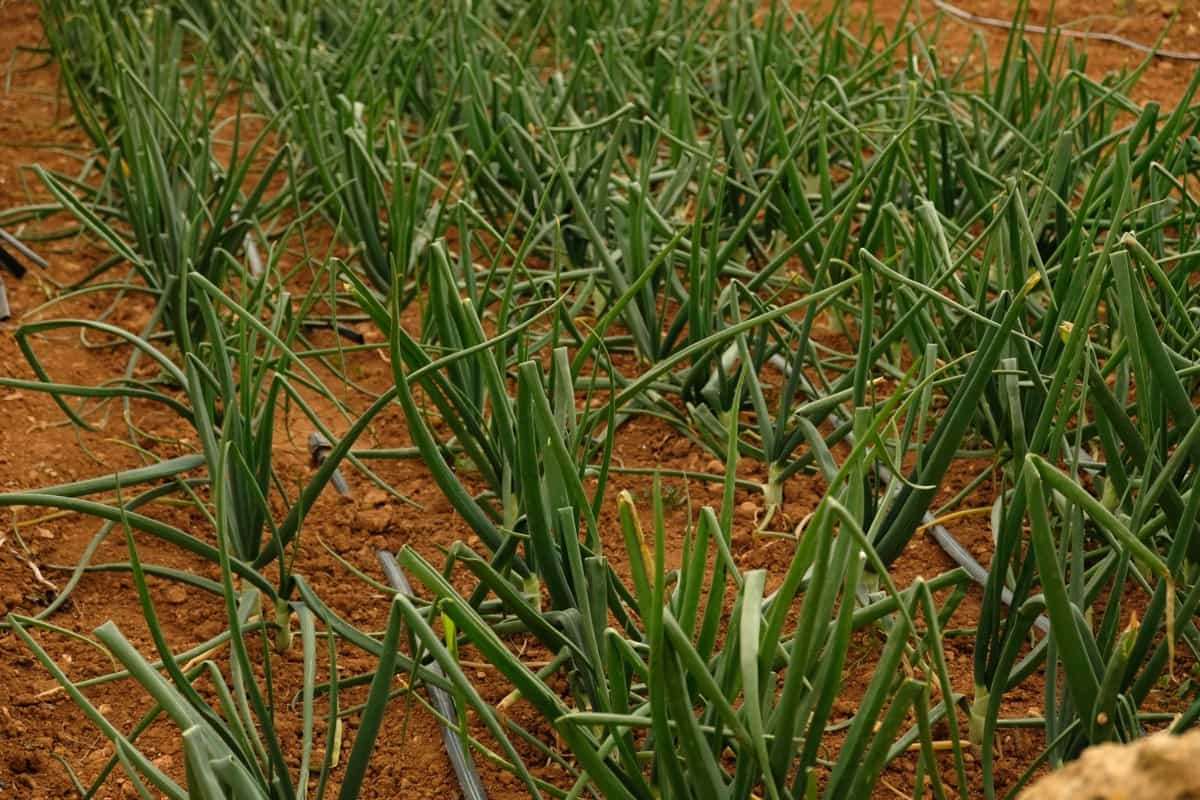
Weed Management in Onion Farms
What is Weed Management in Onion Farms?
Weed management in onion farms involves strategies and practices aimed at controlling unwanted plant growth that competes with onions for resources. Since onions are slow-growing with narrow leaves, they struggle against more aggressive weeds. Effective weed management ensures onions have adequate water, nutrients, and light, promoting healthier growth and higher yields.
Techniques range from mechanical cultivation to chemical herbicides and integrated approaches, each tailored to address specific weed challenges in onion cultivation. Optimal weed management enhances crop quality and quantity, making it a crucial aspect of successful onion farming.
Importance of Weed Management in Onion Farms
Weed management is vital in onion farming due to onions’ slow growth and poor competitiveness against weeds. Weeds can drastically reduce yields by competing for nutrients, water, and sunlight. They also harbor pests and diseases, further stressing onion crops. Effective weed management ensures the efficient use of resources, leading to healthier onions and higher productivity. It also reduces the labor and cost involved in manual weeding, making it an essential practice for economic and agricultural success in onion farming.
Common Weeds Found in Onion Farms
Onion farms commonly face a variety of weeds, including annual and perennial species. Notable ones include nutsedge, field bindweed, bermudagrass, and johnsongrass. These weeds are particularly challenging due to their aggressive growth and ability to outcompete onion plants for resources. Annual broadleaf weeds like pigweeds and lamb’s quarters also pose a threat.
Annual Weeds
These are weeds that complete their life cycle within one year or less. They usually germinate from seeds and produce more seeds before dying. Examples of annual weeds are crabgrass (Digitaria spp.), pigweed (Amaranthus spp.), lambs quarters (Chenopodium album), purslane (Portulaca oleracea), barnyard grass (Echinochloa crus-galli), and nightshade (Solanum spp.).
In case you missed it: Best Season to Grow Onions at Home in India: in Pots, Terrace, Apartment Balcony, and Backyards
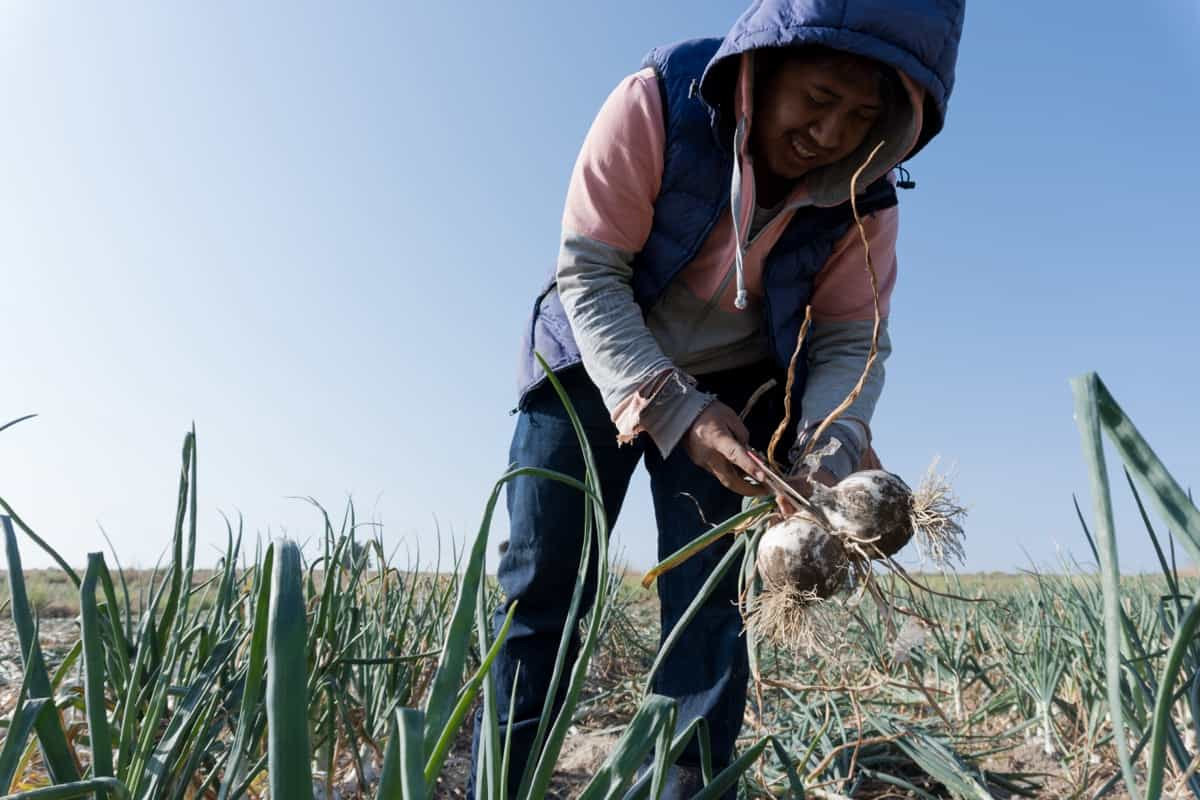
Perennial Weeds
These are weeds that live for more than two years. They usually reproduce by seeds and vegetative parts, such as rhizomes, stolons, bulbs, tubers, or roots. Examples of perennial weeds are nutsedge (Cyperus spp.), quackgrass (Elymus repens), bindweed (Convolvulus arvensis), dandelion (Taraxacum officinale), Canada thistle (Cirsium arvense), and bermudagrass (Cynodon dactylon).
Biennial Weeds
These are weeds that complete their life cycle within two years. They usually grow as rosettes in the first year produce flowers, seeds in the second year. Examples of biennial weeds are wild carrot (Daucus carota), bull thistle (Cirsium vulgare), burdock (Arctium spp.), and mullein (Verbascum thapsus). Identifying and understanding the life cycle of these weeds is crucial for effective management and control of onion cultivation.
Cultural Practices for Weed Control in Onion Farms
Cultural practices in onion weed management involve modifying farming techniques to suppress weed growth. These include crop rotation, cover cropping, and selecting weed-free fields for planting. Utilizing the stale seedbed method, where the field is prepared and irrigated to germinate weeds before onion planting, is also effective. These practices focus on preventing weed emergence and growth and enhancing onion crop health and yield.
Mechanical Weed Control Methods for Onion Farms
Mechanical weed control in onion farms includes methods like cultivation and flaming. Cultivation involves tilling the soil to disrupt weed growth without harming the onion plants. Flaming, using controlled fire to kill weeds, is effective when onions have not yet emerged. These mechanical methods are crucial in managing weeds, especially where herbicide use is limited or in organic farming.
Chemical Weed Control Options for Onion Farms
Chemical weed control in onion farms involves using herbicides to manage weed growth. Herbicides are selected based on the weed species present and the stage of the onion crop. Pre-emergent herbicides are applied before weed germination, while post-emergent herbicides target established weeds. The choice of herbicide must consider the onion variety and comply with agricultural regulations to ensure crop safety and effectiveness.
Integrated Weed Management Strategies for Onion Farms
Integrated weed management (IWM) is a crucial approach for onion farms, aiming to prevent weed emergence, suppress weed growth, and minimize weed seed production. IWM combines various methods of weed control, such as cultural, mechanical, chemical, and biological, to achieve effective and sustainable results. It can help onion farmers reduce their reliance on herbicides, lower production costs, improve soil health, and protect the environment.
In case you missed it: How to Start Onion Farming in the USA: A Step-By-Step Guide to Planting to Harvesting
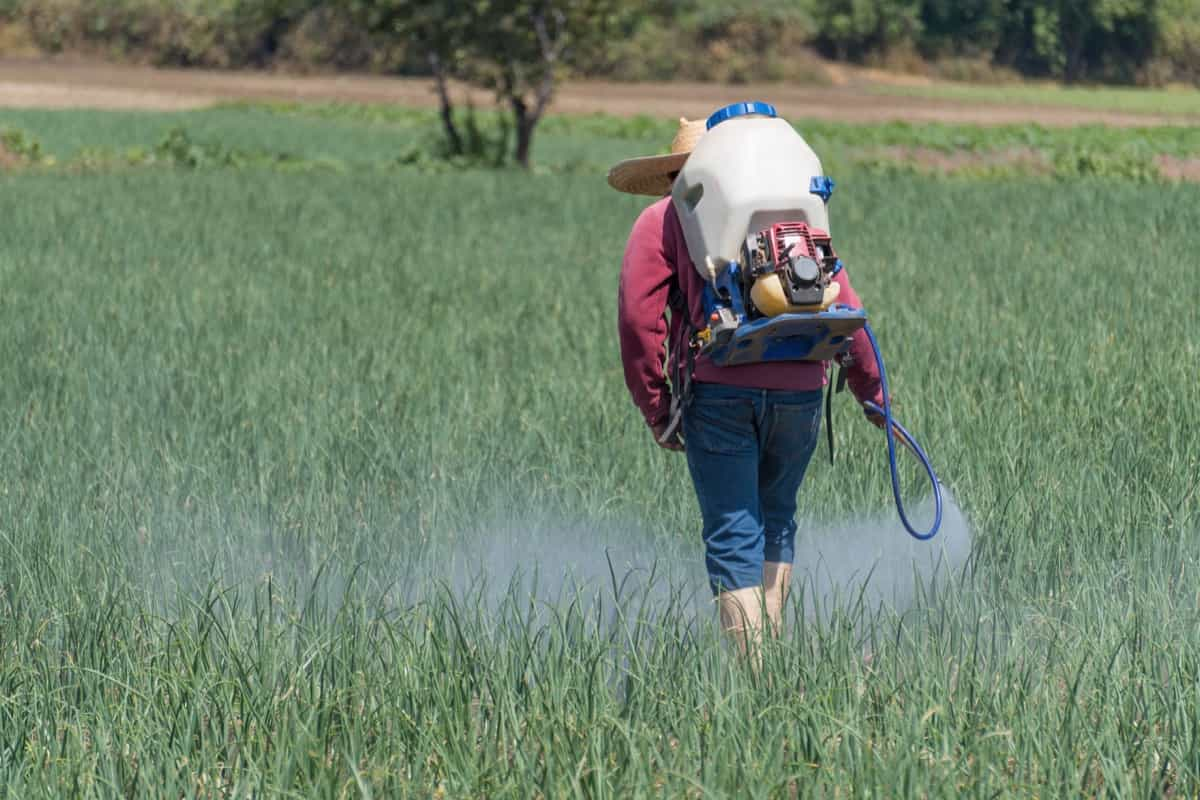
IWM benefits include reducing herbicide resistance, enhancing herbicide efficacy, improving crop competitiveness, preserving beneficial organisms, and preventing soil erosion, nutrient leaching, and water pollution. To implement IWM, farmers should identify weed species, plan crop rotation, choose appropriate onion varieties, prepare seedbeds, apply pre-emergent herbicides, use mechanical cultivation, apply post-emergent herbicides, use mulching, use companion planting, and use biological control.
Organic Weed Management Techniques for Onion Farms
Organic weed management in onion farms focuses on non-chemical methods such as manual weeding, mulching, and organic herbicides. Crop rotation use of cover crops also plays a significant role in suppressing weed growth. These techniques align with organic farming principles, emphasizing environmental sustainability and avoiding synthetic chemicals.
Pre-Emergent Weed Control in Onion Farms
Pre-emergent weed control is a method used to prevent or delay the emergence of weeds before they compete with onion plants. It can be achieved through herbicides or non-chemical techniques like mulching or solarization. Pre-emergent herbicides provide long-lasting weed control, reduce the need for post-emergent herbicides or mechanical cultivation, and improve crop establishment and growth.
However, they require precise timing and application rates, may not control all weed species, and may leach into groundwater or runoff, causing environmental contamination and health risks. To effectively use pre-emergent herbicides, onion farmers should choose the appropriate product based on the weed spectrum, soil type, crop variety, and weather conditions.
They should also carefully read and follow label instructions regarding application timing, rate, method, and equipment. Calibrate the sprayer to ensure uniform coverage, incorporate the herbicide into the soil if needed, and rotate herbicides by different modes of action to prevent resistance development. By following these guidelines, onion farmers can effectively manage weeds in their crops.
Post-Emergent Weed Control in Onion Farms
Post-emergent weed control targets weeds that have already emerged in onion fields. This involves using specific herbicides that kill existing weeds without harming the onion plants. Post-emergent weed control is crucial for onion growers as they face competition from weeds for water, nutrients, light, and space. There are various types of post-emergent weed control, including mechanical, cultural, biological, and chemical methods.
Mechanical weed control involves using tools or machines to remove or damage weeds physically but is labor-intensive and may damage the crop or soil. Cultural weed control uses practices that enhance crop competitiveness and reduce favorable conditions for weeds, which is effective and environmentally friendly. Biological weed control uses living organisms that feed on, parasitize, or infect weeds but is slow and unpredictable.
Chemical weed control uses synthetic or natural substances to inhibit growth or kill weeds, but is costly, hazardous, and may cause resistance, toxicity, or environmental problems. Growers should choose the most appropriate method or combination of methods based on weed species, crop stage, weather conditions, and available resources.
Mulching as a Weed Management Technique in Onion Farms
Mulching in onion farming serves as an effective weed management technique. It involves covering the soil around onion plants with organic materials like straw or synthetic mulch to suppress weed growth. Mulch blocks sunlight, preventing weed germination, and helps in retaining soil moisture, benefiting onion growth. It’s an environmentally friendly method, especially useful in organic farming.
In case you missed it: Top 18 Steps/Ways to Boost Onion Yield: How to Increase Production, Size, and Quality
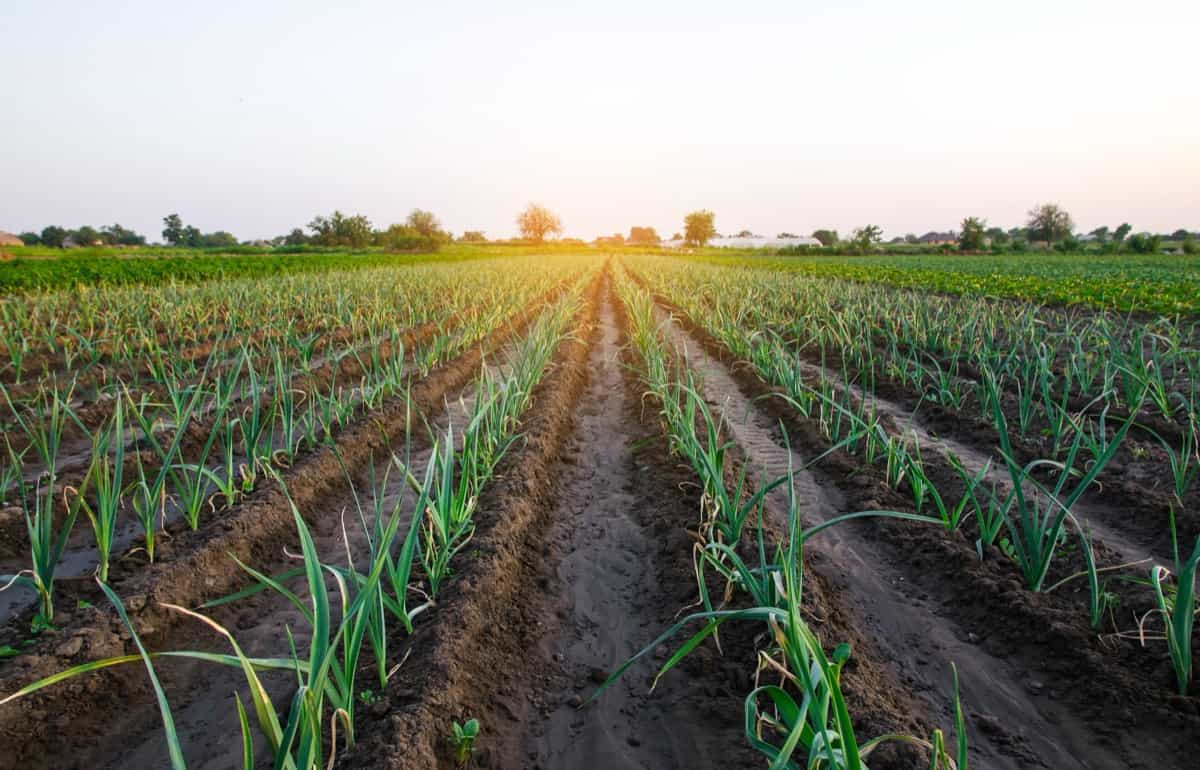
Companion Planting for Weed Control in Onion Farms
Companion planting in onion farming involves growing certain plants alongside onions to deter weeds naturally. These companion plants can act as living mulches, suppressing weed growth through shading and competition for resources. Examples include:
- Planting herbs or other crops that have complementary growth patterns or pest-repelling properties.
- Enhancing overall farm health.
- Reducing weed pressure.
Biological Control of Weeds in Onion Farms
Biological control of weeds is a method of using living organisms to reduce the growth and spread of unwanted plants. In onion farms, biological control can be done by using grazing animals, insects, mites, nematodes, or pathogens that feed on weeds or their seeds. Biological control can also be combined with other methods, such as herbicides, fumigation, or shallow tillage, to achieve better results. Biological control can help onion farmers to save costs, improve yield, and protect the environment.
Weed Management Challenges and Solutions in Onion Farms
Weed management in onion farms presents challenges like resistance to herbicides, environmental concerns, and the labor-intensive nature of mechanical and manual methods. Solutions include:
- Adopting integrated weed management practices.
- Using new and safer herbicides.
- Leveraging technology for precision farming.
- Continuous research and adaptation to local conditions are key to overcoming these challenges.
Impact of Weeds on Onion Growth and Yield
Onion growth has shown that weeds can lead to substantial reductions in onion plant height, leaf number, bulb diameter, and overall yield. Weeds tend to grow rapidly and, if managed, can outcompete onions. The presence of weeds can lead to a 49-86% reduction in bulb yield. Therefore, controlling weeds effectively is essential for maintaining the health and productivity of onion crops.
In case you missed it: Fertilizer Management for Onion: NPK Ratio, and Micronutrients
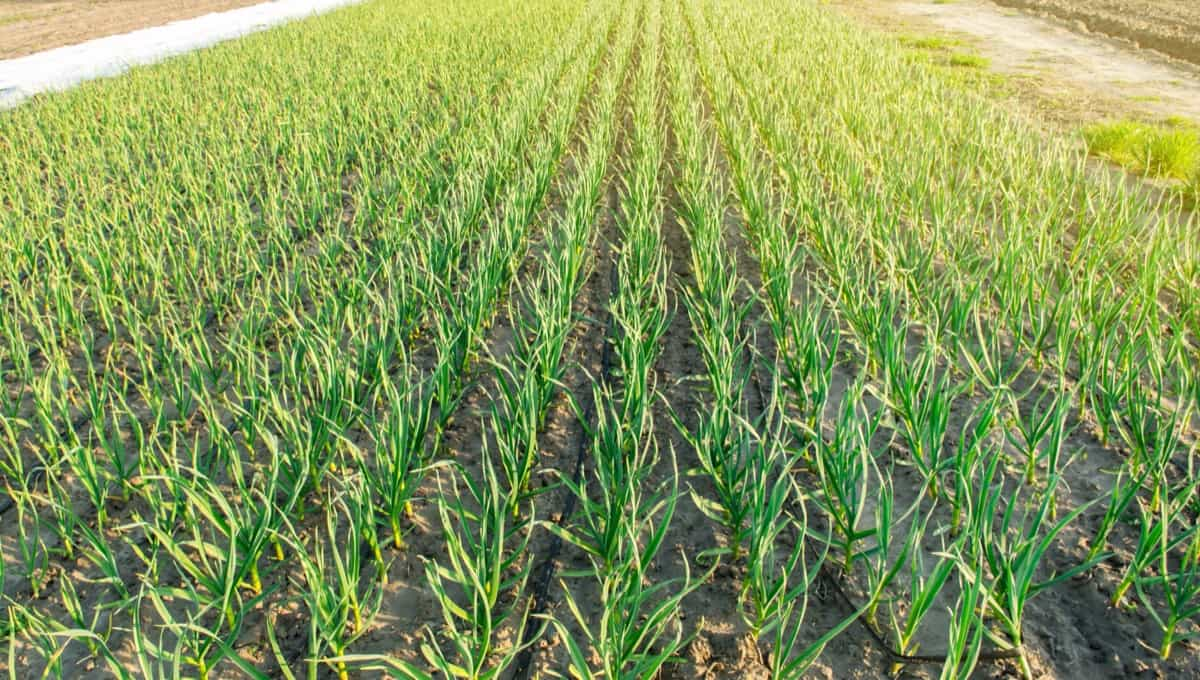
Methods of Weed Management
- Manual and Cultural Methods: Traditional methods like hand weeding are common but can be labor-intensive and costly. Mulching and crop rotation are cultural practices that help in weed control by creating unfavorable conditions for weed growth and breaking the life cycle of weeds.
- Chemical Control: The use of herbicides is widespread in onion weed management. Herbicides like oxyfluorfen and pendimethalin have been effective in reducing weed populations. However, the timing of application and the specific type of herbicide used is crucial for ensuring effectiveness without harming the onion plants.
- Mechanical Methods: Mechanical weed control involves the use of tools and machines to remove weeds. This includes hoeing and using weeders, which not only remove weeds but also help in soil aeration and moisture retention.
- Biological Control: This involves using natural enemies of weeds, like certain insects or microorganisms, to control weed growth. While this method is environmentally friendly, it requires careful management to ensure no harm to the onion crop.
Economics of Weed Management
Effective weed management in onion farming is crucial not just for crop health but also for economic reasons. The use of herbicides, combined with manual weeding, has been found to be effective but can be costly due to high labor costs. Mechanical methods can be more cost-effective and efficient. The choice of process depends on various factors, including the specific weed species, labor availability, and cost considerations.
Challenges and Solutions
One of the main challenges in onion weed management is the labor-intensive nature of traditional methods like hand weeding. The use of herbicides presents challenges related to environmental safety and the development of herbicide resistance in weeds. Integrated weed management, combining different methods, is often the most effective solution. It involves a balance of chemical, mechanical, and cultural practices tailored to the specific conditions of the farm.
Economic Impact of Effective Weed Management in Onion Farms
Weed management is a crucial factor for the profitability and sustainability of onion production. Weeds compete with onion plants for water, nutrients, light, and space, reducing the yield and quality of the crop. Weed control also affects labor costs, herbicide use, soil health, and the environmental impact of onion farming.
In case you missed it: Zero Tillage Maize Cultivation: Economic Viability, Government Policies and Support
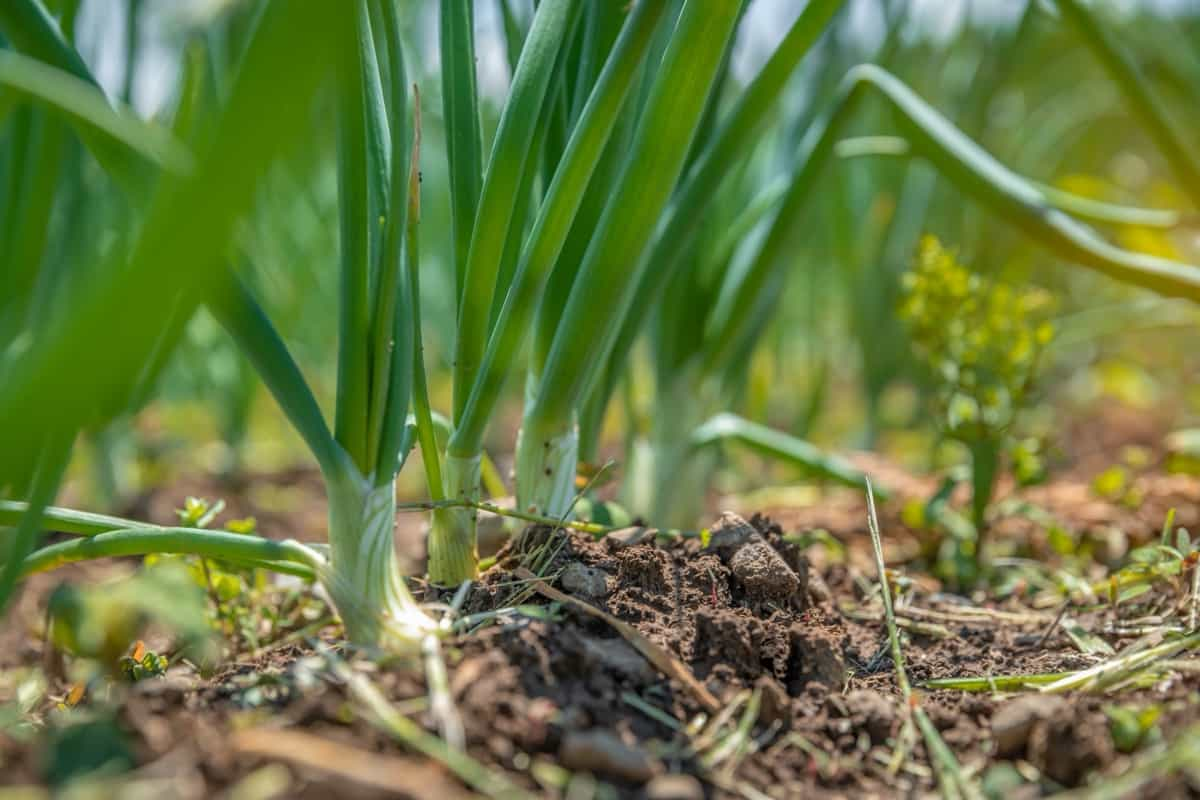
Effective weed management strategies can increase the economic returns of onion growers by optimizing the use of inputs and maximizing the output of marketable onions. In this article, we will review some of the benefits and challenges of different weed management practices in onion farms and provide some recommendations for improving their efficiency and effectiveness.
Conclusion
Effective weed management in onion farms integrates organic practices, mechanical removal, biological control, and selective herbicides. This multifaceted approach balances efficiency, sustainability, and environmental safety, crucial for healthy onion growth and optimal yields while addressing the diverse challenges posed by weed infestations in these specialized agricultural settings.
- Types of Pesticides Used in Agriculture: A Beginner’s Guide
- Economical Aquaculture: A Guide to Low-Budget Fish Farming
- 15 Common Planting Errors That Can Doom Your Fruit Trees
- How to Make Houseplants Bushy: Effective Tips and Ideas
- Innovative Strategies for Boosting Coconut Pollination and Yield
- Pollination Strategies for Maximum Pumpkin Yield
- The Complete Guide to Chicken Fattening: Strategies for Maximum Growth
- Natural Solutions for Tulip Problems: 100% Effective Remedies for Leaf and Bulb-Related Issues
- Revolutionizing Citrus Preservation: Towards a Healthier, Greener Future
- Natural Solutions for Peony Leaf and Flower Problems: 100% Effective Remedies
- Maximizing Profits with Avocado Contract Farming in India: A Comprehensive Guide
- Natural Solutions for Hydrangea Problems: 100% Effective Remedies for Leaf and Flowers
- The Ultimate Guide to Choosing the Perfect Foliage Friend: Bringing Life Indoors
- From Sunlight to Sustainability: 15 Ways to Use Solar Technology in Agriculture
- The Ultimate Guide to Dong Tao Chicken: Exploring from History to Raising
- The Eco-Friendly Makeover: How to Convert Your Unused Swimming Pool into a Fish Pond
- Mastering the Art of Delaware Chicken Farming: Essentials for Healthy Backyard Flocks
- 20 Best Homemade Fertilizers for Money Plant: DIY Recipes and Application Methods
- How to Craft a Comprehensive Free-Range Chicken Farming Business Plan
- Brighten Your Flock: Raising Easter Egger Chickens for Beauty and Bounty
- How to Optimize Your Poultry Egg Farm Business Plan with These Strategies
- Subsidy for Spirulina Cultivation: How Indian Government Schemes Encouraging Spirulina Farmers
- Ultimate Guide to Raising Dominique Chickens: Breeding, Feeding, Egg-Production, and Care
- Mastering the Art of Raising Jersey Giant Chickens: Care, Feeding, and More
- Ultimate Guide to Raising Legbar Chickens: Breeding, Farming Practices, Diet, Egg-Production
- How to Raise Welsummer Chickens: A Comprehensive Guide for Beginners
- How to Protect Indoor Plants in Winter: A Comprehensive Guide
- Ultimate Guide to Grow Bag Gardening: Tips, Tricks, and Planting Ideas for Urban Gardeners
- Guide to Lotus Cultivation: How to Propagate, Plant, Grow, Care, Cost, and Profit
- Agriculture Drone Subsidy Scheme: Government Kisan Subsidy, License, and How to Apply Online
- Ultimate Guide to Raising Araucana Chickens: Breed Profile, Farming Economics, Diet, and Care
- Bringing Hydroponics to Classroom: Importance, Benefits of Learning for School Students
- Ultimate Guide to Raising Polish Chickens: Breed Profile, Farming Economics, Diet, and Care
- Ultimate Guide to Raising Australorp Chickens: Profile, Farming Economics, Egg Production, Diet, and Care
- Silkie Chicken Farming: Raising Practices, Varieties, Egg Production, Diet, and Care
- Sussex Chicken Farming: Raising Practices, Varieties, Egg Production, Diet and Care